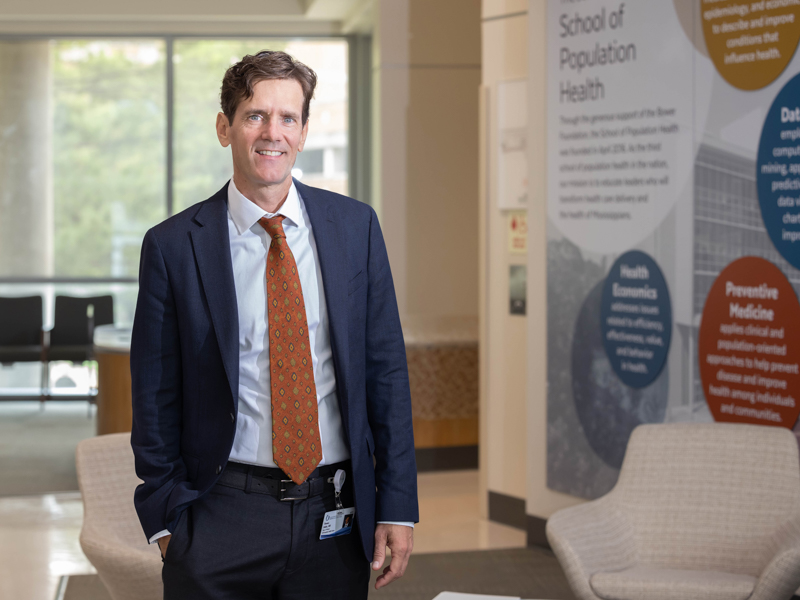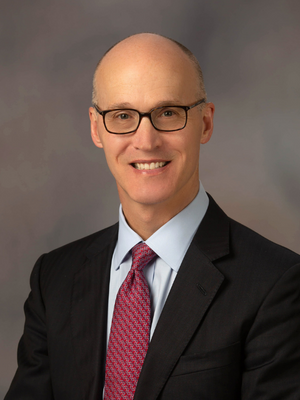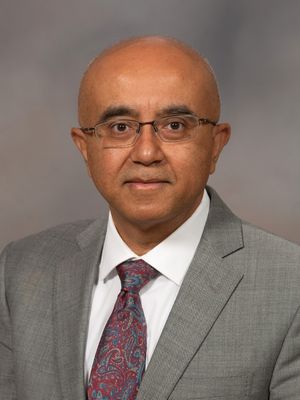Dobbs takes helm of Population Health, determined to make a healthier state

Though Dr. Thomas Dobbs has spent most of his career as a public health servant, a career in medicine was not his first choice. As an applied physics major at Emory University, he had plans of becoming a theoretical physicist.
A summer spent at the university’s hospital, where he learned that working in health care is a marriage of science, service and humanities, brought a change of heart to the Alabama native.
“It seemed like the right thing,” he said. “I was plenty smart, but I was never gonna win a Nobel Prize.”
Three decades later, the new dean of the John D. Bower School of Population Health at the University of Mississippi Medical Center appears to have made the smart decision about his career trajectory.
As dean, he leads a school that consists of three departments: data science, which focuses on extracting knowledge and insights from data; population health science, which trains graduates to use policies, programs and other interventions to improve health outcomes and reduce disparities; and preventive medicine, which, shared with the School of Medicine, trains health professionals in disease prevention and health promotion for both individuals and populations.
“If you think about health care, we take care of individuals, which is super important to do,” the dean explained. “But when you think about population health, we think about the health of the whole population and what are the conditions that drive health or lack of health for a community.”
Only about 20 percent of a person’s well-being is related to access to clinical health care, Dobbs said. The other 80 percent come from environmental factors: the community in which you live, access to education and healthy foods, and healthy behaviors.
“So it’s all that other stuff that in the United States we’ve ignored more than we’ve paid attention to,” he said. “And that’s what population health does. We’re trying to say, ‘Hey, we’re never going to be healthy if we just keep throwing money at health care.’
“When we look at other developed countries in the world that are in much better health than we are, is it because they’ve poured a lot more money into health care? Of course it’s not. It’s because they have policies, approaches and support systems that make it most likely for people to be healthy, unlike here where it’s extremely difficult, to walk, even. So our activity is going to be low. It’s super easy to have access to unhealthy foods because they’re cheap, they taste good and they’re easy. So in the United States, it’s hard to be healthy.”
Before taking on this role, Dobbs served the Mississippi State Department of Health as state epidemiologist and regional, deputy and state health officer, the latter of which he directed the state’s response to the COVID pandemic and addressed health inequities that plague the state. He has also worked in national and international leadership roles in the fight against diseases including HIV and tuberculosis.
Still, his academic administrative experience was “on the lean side” prior to this appointment, he said.
Where he is not lacking, Dobbs said, is in engaging communities, understanding what’s happening outside the walls of academia, having relationships and having seen the real-world impact of social determinants on individuals and communities.
“And having had other leadership roles that involve varying degrees of stress and challenges, having weathered some of those and learned from them, hopefully I can bring something to the school.”
Dr. Scott Rodgers, associate vice chancellor for academic affairs, said Dobbs brings a wealth of experience to the role.

“In his role as the state health officer for the Mississippi State Department of Health, Dr. Dobbs had responsibility over a large organization that worked to meet the health care needs of the roughly 3 million people residing in Mississippi,” Rodgers said. “He has traveled all over the state, meeting people where they live, interacting with and learning from community leaders, and extending a helping hand wherever and whenever possible. Dr. Dobbs isn’t afraid of hard work, and he possesses a high level of compassion and grit that enabled him to succeed in his role for the state.
“In his new role as dean for the School of Population Health, we are counting on him to bring to the job the determination and vision that we already know he possesses, such that he builds academic and outreach programs that help us address the needs of our citizens. He has exactly the right mix of experience, wisdom, know-how and transformative spirit to succeed at a high level, and we cannot wait to see what the future holds for his school. We are in exceptional hands.”
A month-and-a-half into the role, Dobbs has established a few short-term goals. One is to grow enrollment, which stands at 58 students. He also wants to provide what he calls a “population-based mentality” and educational curriculum to other schools at UMMC.
“Long-term, we have an opportunity to be a world-class powerhouse research institution around public health,” Dobbs said. “Part of it is because we live in the nexus of all the bad things that cause bad health. Not only will we have things that can make a difference, but there will be opportunities with external partners doing research to bring in grant funding. We have great researchers now, but to develop the whole program into a world-class research operation, educating future health leaders in population health and all its different intricacies.”
Dobbs said he wants the school to be a “force for driving, inducing, catalyzing change” in the state, particularly in areas that make communities unhealthy that others in health care don’t have time to focus on.
“Mississippi has a segregated education system,” he said. “And no one’s really addressing it. But that’s what population health’s about. It’s those sorts of things, taking a mirror to ourselves and sort of helping bring together those folks who can make things different.”
So far, his average day is evolving, Dobbs said. On paper, he spends 70 percent of each week doing administrative work and teaching, 20 percent on infectious disease and clinical work through an appointment in the Division of Infection Diseases under the Department of Medicine, and 10 percent assigned to the health department running the Crossroads Sexual Health Clinic.
In doing so, he works closely with the Jackson Heart Study, Myrlie Evers-Williams Institute for the Elimination of Health Disparities, Adult Specialty Care, and people living with HIV.
“It’s a nice balance. Variety’s fun. Things overlap,” he said of his responsibilities. “It also keeps me part of the public health, and having that appointment in the health department helps maintain that relationship, because population health and public health go hand in hand.”
He is also excited about working with Dr. Saurabh Chandra, chief telehealth officer, on advancing telehealth opportunities for people at risk for or living with HIV.

The feeling is mutual, said Chandra, who shared these Centers for Disease Control and Prevention statistics: about 12,000 people are living with HIV in Mississippi and 4,500 at high risk for developing HIV, less than 25 percent of whom are prescribed pre-exposure prophylaxis medication.
The Center for Telehealth worked with the Department of Infectious Diseases to develop an app that will provide education and access to care for patients at high risk for HIV, said Chandra. Called UMMC HIV Cares, it will be available via app stores in the coming weeks.
“We are very excited to partner with Dr. Dobbs and leverage his knowledge and expertise to make this app available to high-risk patients in the state as well as provide access to health care through telemedicine for patients already diagnosed with HIV.”
Dobbs invites others interested in pursuing a population health agenda to reach out about forming partnerships.
Outside of work, being a doctor seems to run in the family. He’s enjoying spending time these days with wife Dr. Kimberly Dobbs, a pulmonary and critical care physician at UMMC. Having worked in separate cities for eight of the past 10 years, it’s nice to live and work together, he said. She joined the staff in July, one month before his appointment.
The parents of two children, one in medical school and one in college, met during their first year of medical school and married two years later.
Dobbs himself is not the first doctor in the family; both his grandfather and great-grandfather were physicians.
The legacy brings him full circle to why he went into medicine.
“I think we all want to make a difference one way or the other. And hopefully we make differences in a good way."


